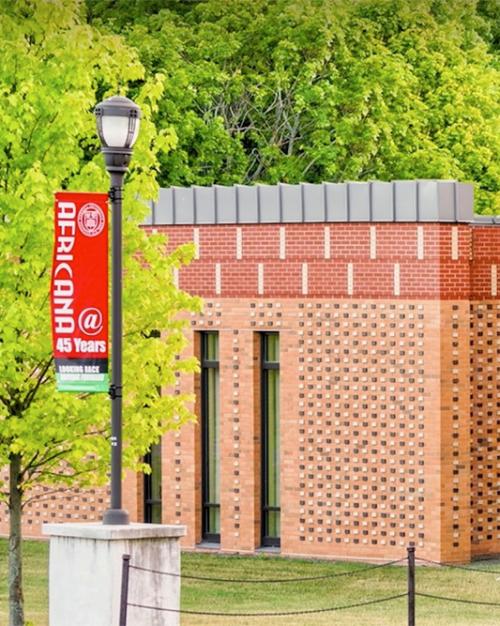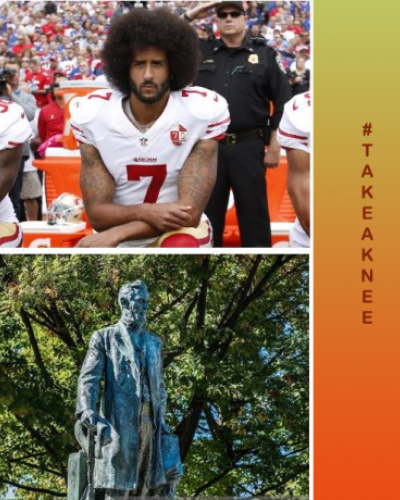Come join faculty, staff and students in a protest against racism #takeaknee
#TakeAKnee to Protest Racism this Wednesday at 12:30 on the Arts Quad
During the 2016 football preseason, long before Donald Trump was elected President, NFL quarterback Colin Kaepernick began kneeling during the playing of the National Anthem to protest the killing of black Americans by police officers and the official sanctioning of the many forms of racism that daily assault the lives of people of color in this country. As he told the media, “I am not going to stand up to show pride in a flag for a country that oppresses black people and people of color. To me, this is bigger than football and it would be selfish on my part to loo...k the other way. There are bodies in the street and people getting paid leave and getting away with murder.” His silent gesture of non-violent protest has since been adopted by hundreds of other players, as well as athletes in other sports and leagues, who kneel, link arms, or raise their fists in the air during the playing of the anthem to protest systemic racism. Even as this gesture of protest has caught on, however, some black athletes are paying a heavy price for exercising their right to free speech. A few days ago Donald Trump entered the fray with divisive tweets denouncing the protesters, calling on football fans to boycott their games and demanding that team owners suspend or fire any player who chose to exercise his constitutional right to free speech by refusing to stand for the anthem. For some, it seems, protests against racism are more deserving of condemnation than racism itself.
We, the undersigned faculty, invite the Cornell and Ithaca communities to join us this Wednesday at 12:30 pm to #TakeAKnee against racism by kneeling down in the Arts Quad for a moment of silence to show our solidarity with the fight against racism, white supremacy, and state-sanctioned violence against people of color. We kneel not only with the black athletes who are risking their careers to protest racism, but most importantly with the black students and other people of color here on campus whose civil rights and human dignity have been demeaned and violated in recent weeks by the actions of racists, nationalists, and white supremacists within our own community.
On September 15, a black student in Collegetown was taunted with racial slurs and brutally beaten by white fraternity members for no reason other than the color of his skin. In another incident, students at the Latino Living Center heard chants of “Build a wall!” outside the windows of their residence. In response to these and other acts of violence and intimidation, Black Students United addressed a letter to the university administration last week outlining a set of demands to address racism in our campus community and make meaningful changes to promote diversity and inclusion.
Kaepernick’s anthem protest is important because it reminds us that racism is not only a matter of individual acts of harassment and aggression on the part of a few bad actors, but something that is enabled and perpetuated by institutional practices that systematize inequality and exclusion. Let us join together to show solidarity with the members of our community who have been affected by racism and hate, to hear their demands, and to work together to create a more equitable and inclusive Cornell.
The Cornell Coalition for Inclusive Democracy
Sandra Babcock, Law School
Ed Baptist, History
Ernesto Bassi, History
Kaushik Basu, Economics
Jonathan Boyarin, Anthropology and Jewish Studies
Mary Pat Brady, English
Ross Brann, Near Eastern Studies
Nancy Brooks, City and Regional Planning
Elizabeth Brundige, Law School
Cathy Caruth, English and Comparative Literature
Debra Castillo, Comparative Literature and Latina/o Studies
Derek Chang, History and Asian-American Studies
Julia Chang, Romance Studies
Maria Lorena Cook, Industrial and Labor Relations
Angela Cornell, Law School
Raymond Craib, History and Latina/o Studies
Ileen DeVault, Industrial and Labor Relations
Ella Maria Diaz, English and Latina/o Studies
Matthew Evangelista, Government
Jason Frank, Government
Jill Frank, Government
Kevin Gaines, Africana Studies
Maria Cristina Garcia, History, American Studies, and Latina/o Studies
Durba Ghosh, History and FGSS
Sabine Haenni, Performing and Media Arts and American Studies
Salah Hassan, History of Art
Geoffrey Hill, Flora Rose House
Robert Hocket, Law School
Sheri Johnson, Law School
Rayna Kalas, English
Mary Katzenstein, Government and American Studies
Rachel Kerr, Development Sociology
Jonathan Kirshner, Government
Neema Kudva, City and Regional Planning
Risa Lieberwitz, Industrial and Labor Relations
Kathleen Perry Long, Romance Studies and FGSS
Delphine Lourtau, Law School
Joseph Margulies, Law School and Government
Tracy McNulty, Comparative Literature
Dick Miller, Philosophy
Mostafa Minawi, History
Satya Mohanty, English
Christopher Monroe, Near Eastern Studies
Timothy Murray, Comparative Literature and English
Linda Nicholson, Molecular Biology and Genetics
Scott Peters, Development Sociology
Aziz Rana, Law School
Masha Raskolnikov, English
Ken Roberts, Government
Nerissa Russell, Anthropology
Neil Saccamano, English
Vilma Santiago-Irizarry, Anthropology and American Studies
Roberto Sierra, Music
Lara Skinner, Industrial and Labor Relations
Adam Smith, Anthropology
Eric Tagliacozzo, History
Sid Tarrow, Government
Chantal Thomas, Law School
Robert Travers, History
Sofia Villenas, Anthropology
Helena Viramontes, English and Latina/o Studies
Penny Von Eschen, History
Rachel Weil, History
John Hubbel Weiss, History
Carol Warrior, English and American Indian and Indigenous Studies
Marina Welker, Anthropology
Sunn Shelley Wong, English and Asian-American Studies
#TakeAKnee to Protest Racism this Wednesday at 12:30 on the Arts Quad
During the 2016 football preseason, long before Donald Trump was elected President, NFL quarterback Colin Kaepernick began kneeling during the playing of the National Anthem to protest the killing of black Americans by police officers and the official sanctioning of the many forms of racism that daily assault the lives of people of color in this country. As he told the media, “I am not going to stand up to show pride in a flag for a country that oppresses black people and people of color. To me, this is bigger than football and it would be selfish on my part to loo...k the other way. There are bodies in the street and people getting paid leave and getting away with murder.” His silent gesture of non-violent protest has since been adopted by hundreds of other players, as well as athletes in other sports and leagues, who kneel, link arms, or raise their fists in the air during the playing of the anthem to protest systemic racism. Even as this gesture of protest has caught on, however, some black athletes are paying a heavy price for exercising their right to free speech. A few days ago Donald Trump entered the fray with divisive tweets denouncing the protesters, calling on football fans to boycott their games and demanding that team owners suspend or fire any player who chose to exercise his constitutional right to free speech by refusing to stand for the anthem. For some, it seems, protests against racism are more deserving of condemnation than racism itself.
We, the undersigned faculty, invite the Cornell and Ithaca communities to join us this Wednesday at 12:30 pm to #TakeAKnee against racism by kneeling down in the Arts Quad for a moment of silence to show our solidarity with the fight against racism, white supremacy, and state-sanctioned violence against people of color. We kneel not only with the black athletes who are risking their careers to protest racism, but most importantly with the black students and other people of color here on campus whose civil rights and human dignity have been demeaned and violated in recent weeks by the actions of racists, nationalists, and white supremacists within our own community.
On September 15, a black student in Collegetown was taunted with racial slurs and brutally beaten by white fraternity members for no reason other than the color of his skin. In another incident, students at the Latino Living Center heard chants of “Build a wall!” outside the windows of their residence. In response to these and other acts of violence and intimidation, Black Students United addressed a letter to the university administration last week outlining a set of demands to address racism in our campus community and make meaningful changes to promote diversity and inclusion.
Kaepernick’s anthem protest is important because it reminds us that racism is not only a matter of individual acts of harassment and aggression on the part of a few bad actors, but something that is enabled and perpetuated by institutional practices that systematize inequality and exclusion. Let us join together to show solidarity with the members of our community who have been affected by racism and hate, to hear their demands, and to work together to create a more equitable and inclusive Cornell.
The Cornell Coalition for Inclusive Democracy
Sandra Babcock, Law School
Ed Baptist, History
Ernesto Bassi, History
Kaushik Basu, Economics
Jonathan Boyarin, Anthropology and Jewish Studies
Mary Pat Brady, English
Ross Brann, Near Eastern Studies
Nancy Brooks, City and Regional Planning
Elizabeth Brundige, Law School
Cathy Caruth, English and Comparative Literature
Debra Castillo, Comparative Literature and Latina/o Studies
Derek Chang, History and Asian-American Studies
Julia Chang, Romance Studies
Maria Lorena Cook, Industrial and Labor Relations
Angela Cornell, Law School
Raymond Craib, History and Latina/o Studies
Ileen DeVault, Industrial and Labor Relations
Ella Maria Diaz, English and Latina/o Studies
Matthew Evangelista, Government
Jason Frank, Government
Jill Frank, Government
Kevin Gaines, Africana Studies
Maria Cristina Garcia, History, American Studies, and Latina/o Studies
Durba Ghosh, History and FGSS
Sabine Haenni, Performing and Media Arts and American Studies
Salah Hassan, History of Art
Geoffrey Hill, Flora Rose House
Robert Hocket, Law School
Sheri Johnson, Law School
Rayna Kalas, English
Mary Katzenstein, Government and American Studies
Rachel Kerr, Development Sociology
Jonathan Kirshner, Government
Neema Kudva, City and Regional Planning
Risa Lieberwitz, Industrial and Labor Relations
Kathleen Perry Long, Romance Studies and FGSS
Delphine Lourtau, Law School
Joseph Margulies, Law School and Government
Tracy McNulty, Comparative Literature
Dick Miller, Philosophy
Mostafa Minawi, History
Satya Mohanty, English
Christopher Monroe, Near Eastern Studies
Timothy Murray, Comparative Literature and English
Linda Nicholson, Molecular Biology and Genetics
Scott Peters, Development Sociology
Aziz Rana, Law School
Masha Raskolnikov, English
Ken Roberts, Government
Nerissa Russell, Anthropology
Neil Saccamano, English
Vilma Santiago-Irizarry, Anthropology and American Studies
Roberto Sierra, Music
Lara Skinner, Industrial and Labor Relations
Adam Smith, Anthropology
Eric Tagliacozzo, History
Sid Tarrow, Government
Chantal Thomas, Law School
Robert Travers, History
Sofia Villenas, Anthropology
Helena Viramontes, English and Latina/o Studies
Penny Von Eschen, History
Rachel Weil, History
John Hubbel Weiss, History
Carol Warrior, English and American Indian and Indigenous Studies
Marina Welker, Anthropology
Sunn Shelley Wong, English and Asian-American Studies





